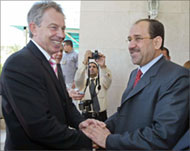US to play supporting role in Iraq
The US will increasingly play a supporting role as Baghdad’s new government gains its footing, the American president has said.

But George Bush offered no timetable for a US withdrawal despite the new prime minister’s promise that Iraqi forces would be in charge in most of the country by December and a British prediction that foreign troops may be out within four years.
Instead, the US leader hailed Saturday’s formation of Iraq’s coalition government, after months of sectarian struggle, as a “watershed event” that opens a new chapter in US-Iraqi relations.
But a senior administration official doubted the formation of the new government would result in an immediate decrease in violence, saying it will take a long-term effort to improve security and government services and promote reconciliation between the warring parties.
“It would be misleading to say we expect any kind of immediate reduction in violence,” said the official, who spoke on condition of anonymity.
Disapproval ratings
Bush is trying to rebound from the lowest approval ratings of his presidency, driven largely by a loss of confidence in his handling of the war in Iraq, where more than 2,400 US soldiers have been killed.
“I know there’s concern from the American people that we can’t win,” Bush told a restaurant owners’ convention in Chicago on Monday, adding that “the way forward will bring more days of challenge and loss”.
But he sought to assure his audience that, despite some mistakes, his administration was on the right track three years after a US-led invasion toppled Saddam Hussein.
“The United States and our coalition partners will work with the new Iraqi government to adjust our methods and strengthen our mutual efforts to achieve victory over our common enemies,” Bush said.
“As the new Iraqi government grows in confidence and capability, America will play an increasingly supporting role,” he said.
Blair visit
Tony Blair, the British prime minister and Bush’s staunches ally on the Iraq war, flew to Baghdad on Monday to express support for Nuri al-Maliki, the Iraqi prime minister who heads the country’s first permanent government since the invasion.
 |
|
Blair (L) met al-Maliki in Baghdad |
The White House was preparing for a Blair visit for talks with Bush on Thursday.
But the administration official poured cold water on speculation that they might announce an agreement to cut foreign troops in Iraq significantly by the end of 2006.
“We do not anticipate that they will announce a fixed number by the end of the year,” the official said.
A British official accompanying Blair said London hoped all but some non-combatant foreign soldiers could be withdrawn by the next Iraqi election in late 2009, provided the country moved in the right direction.
Bush has repeatedly refused to say when America’s 133,000 troops in Iraq will start coming home, saying it will depend on when Iraqi forces can take responsibility for security.
He said he had instructed Condoleezza Rice, his secretary of state, and Donald Rumsfeld, the defence secretary, to engage al-Maliki and other leaders to assess their needs and capabilities, “so we’ll be in the best position to help them succeed”.
The administration official said the United States hoped al-Maliki would form the rest of the government within a week or so, and, once this is completed, Washington will discuss whether it would be useful to have talks with Iran about what Bush sees as interference in Iraqi affairs.